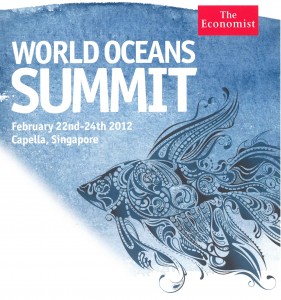by Daniel Pauly
 The British magazine The Economist hosted a huge “World Ocean Summit” in Singapore earlier this year, designed to find solutions to the ills that beset our oceans. And more precisely, to identify remedies that entrepreneurs could find ways to invest and profit from. It sounded like a reasonable goal, because we tend to live in democratic countries with market economies shaped by private enterprise, so I accepted their invitation. The head of the World Bank attended, as well as ministers from various countries, CEOs of big fishing companies, heads of international environmental NGOs, hedge fund managers, scientists…
The British magazine The Economist hosted a huge “World Ocean Summit” in Singapore earlier this year, designed to find solutions to the ills that beset our oceans. And more precisely, to identify remedies that entrepreneurs could find ways to invest and profit from. It sounded like a reasonable goal, because we tend to live in democratic countries with market economies shaped by private enterprise, so I accepted their invitation. The head of the World Bank attended, as well as ministers from various countries, CEOs of big fishing companies, heads of international environmental NGOs, hedge fund managers, scientists…
It should have worked, but it didn’t really, despite the beautiful resort where the event took place and the flawless organization. I think it was because – mostly subtly, sometimes not so subtly – our very determined hosts, from the Editor-in-Chief to the lowliest of The Economist staffers, were pushing for “market solutions,” insisting that the remedies we identified had to make money for hedge fund managers and other investors.
It sounded all right at first – but how would this work if a health care system, for example, wasdesigned this way? Wouldn’t it leave too many people untreated, because no money can be made off them? Also, are fisheries not a gigantic example of a “market failure,” as economists call the mess we are in? (Although it is a small mess compared with that of our banking system.) But there was no space at the summit to discuss any of these things, and the complementary roles of governments and civil society. Everything that moves had to be turned into a commodity, and even some things that don’t move, like marine protected areas, which were identified as one of the places for profitable investments.
Thus my disappointment and perhaps that of Fisheries Centre Director Dr Rashid Sumaila too, who also attended. I did have the opportunity to address one of the summit’s working groups where I mentioned that the invitation of The Economist, besides being a compliment, also was a challenge, because I am often accused of spreading gloom and doom, in spite of being neither gloomy nor doomy.
The point is that a doctor – and I am one, if not of medicine – must correctly diagnose the disease at hand before being able to propose solutions leading back to health. The disease of industrial fisheries, I suggested, is “expansionitis” and it is caused largely by demand for fish in rich countries. Indeed, industrial fisheries have gone so far that we’re expanding into the world’s oceans at a rate of 1 million km2 and southward by 0.8° of latitude per year. Expansionitis is feeding essentially insatiable markets in Europe, North America and Northeast Asia, from finite fishing grounds in Africa, Latin America and Tropical Asia. Japan and the US import 60% to 70% of their food, the EU 70% to 80%. Industrial fishing is not about feeding the world’s poor.
Then, because we we re supposed to emphasize remedies, I listed those remedies for expansionitis about which there is
widespread agreement:
• Reduce and eventually abolish subsidies to fisheries – they are what feeds expansionitis;
• Rebuild fish stocks in developed countries, so that they need not grab so much of the developing countries’ fish, and export the lessons learned to the developing world;
• Allow developing countries to catch and process their own fish, and export a part of the value-added products to the developed world;
• Create arrangements providing exclusive access (to coastal resources in both developing and developed countries) to small-scale fisheries, which catch far more than industrial fisheries and could catch even more if not exposed to competition from industrial vessels;
• Reduce and eventually ban discards (Norway does it) and consume small fish directly, rather than turning them into fishmeal.
There is a huge reserve there.
But let’s face it: these remedies (all “market solutions,” incidentally) if implemented, would be the result of mostly public policy, which then would benefit the fishing industry in the long-term. In the short term, however, these remedies will be fought against tooth and nail by our friends from the private sector, that is those The Economist wants us not only to work with (which is a good thing), but to put in the driver’s seat. These are the reasons why I felt down at the Ocean Summit.

